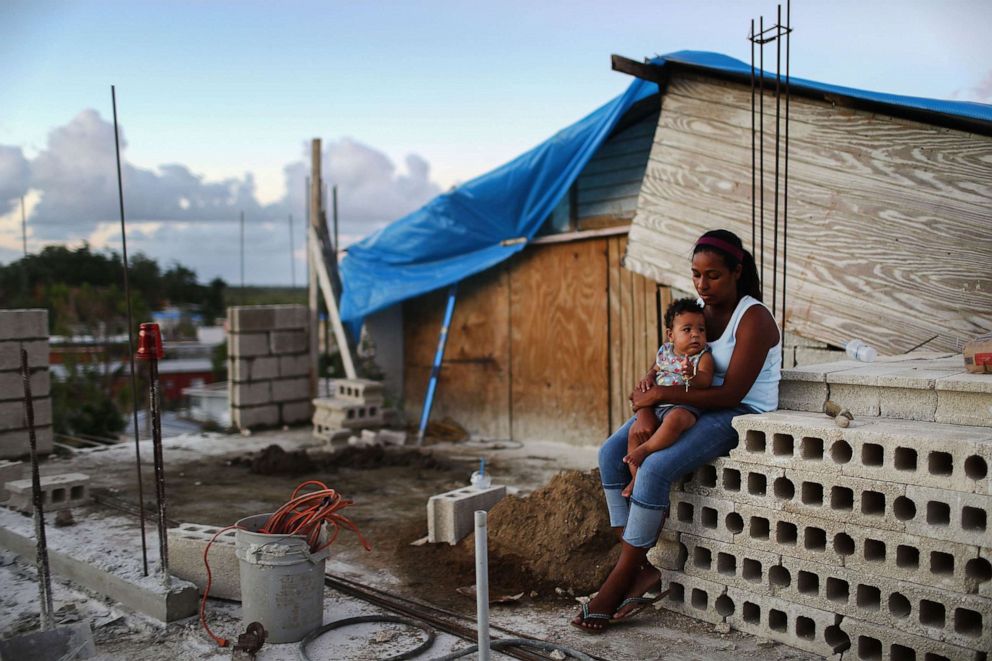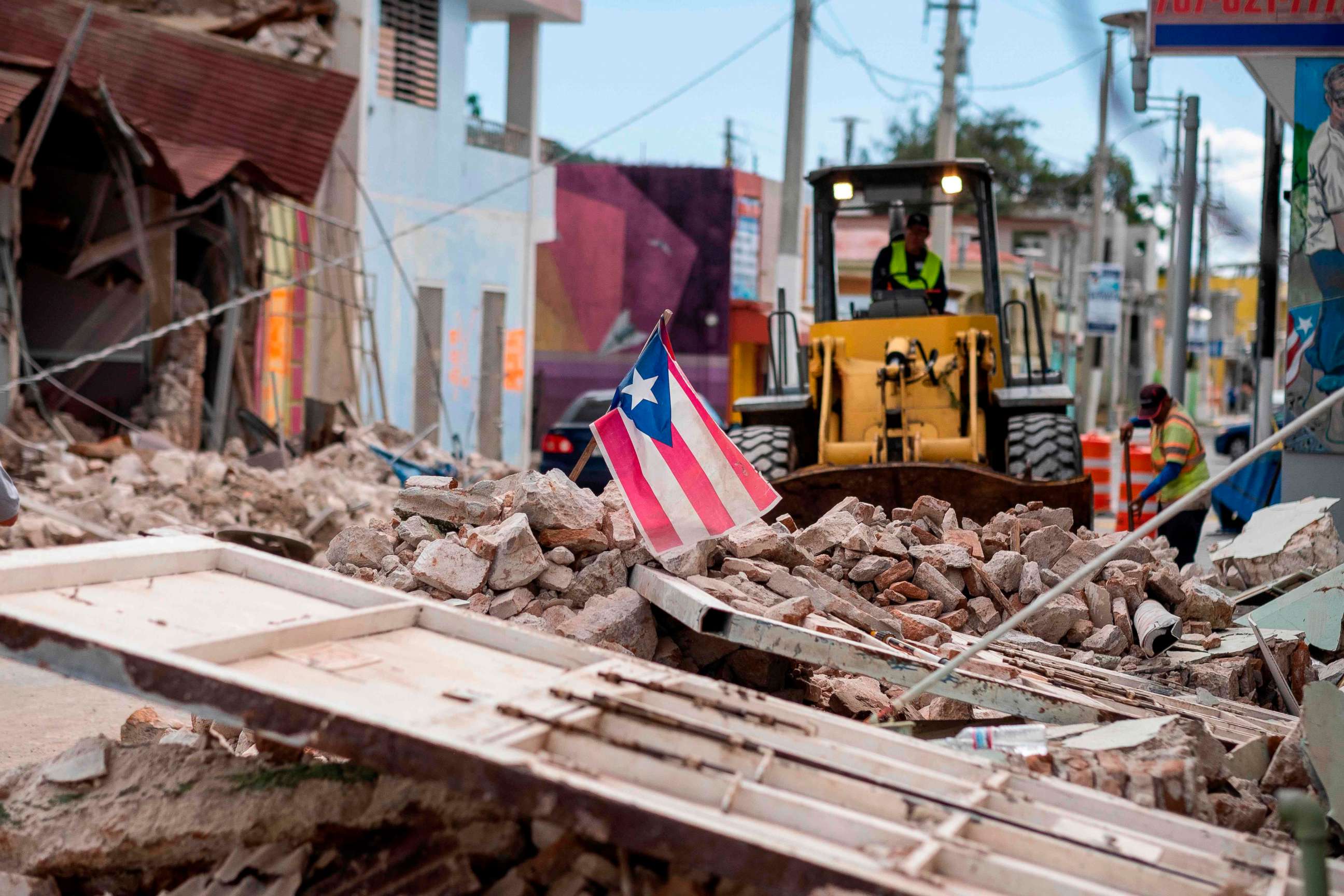Coronavirus hits Puerto Rico, still in turmoil from Hurricane Maria
Earthquakes, a financial crisis, government scandals have plagued the island.
As the novel coronavirus continues to have an impact on the lives of millions of Americans across the nation, residents of Puerto Rico are already feeling the toll of a crisis within a crisis.
In the last three years, the U.S. territory has gone through a deadly hurricane, an unprecedented financial crisis, hundreds of earthquakes and government scandals.
Now, with a virus that has already taken the lives of at least 42 people and left over 780 individuals infected, residents of the island are fighting the COVID-19 pandemic with a shaky infrastructure.
"I'm worried of the stability of the government," Enid Zurita said.
Zurita and her family are among the 20,000 households in Puerto Rico that don't have a stable roof, nearly three years after Hurricane María.

Mounting frustration
Ever since Maria hit on the morning of Sept. 20, 2017, the 43-year-old Zurita, her husband and her two daughters have been living with Zurita's mother.
Being away from the place she calls home was something she was looking forward to changing soon. After waiting and waiting for the government to respond, the family decided to seek help in places not related to the federal or local governments.
Techos Pa' Mi Gente, a not-for-profit organization, took Zurita's case and offered to repair the family's home in Caguas, 20 miles south of San Juan.
Everything was starting to fall into place, but the week Techos Pa' Mi Gente was scheduled to start repairs, the governor of Puerto Rico, Wanda Vázquez, imposed a stay-at-home order to fight the COVID-19 outbreak on the island. The rebuilding has been delayed until the pandemic ends.
"Until when will we have to wait?" Zurita said, in a tone that indicated her frustration.
Community leader Omayra Ríos says that lately in Puerto Rico when it rains it pours. She has been working for 20 years with the low-income community of Shanghai in San Juan. One of her main worries is the stability and well-being of its residents in this pandemic. "The future is very uncertain," Ríos said. Families in this community are among the 43% of Puerto Ricans who live under the poverty level.
"How are they going to pay bills?" Ríos asked. Just like in the states, jobless claims in the U.S. territory have spiked. According to Puerto Rico's General Union of Workers, at least 300,000 people have filed for unemployment benefits during the coronavirus crisis.
"The economy is going to drop"
Although the territory will receive funds from the $2.2 trillion stimulus package approved by the U.S. Congress, there is worry among economists about when Puerto Rico will have access to the aid.
Jose Caraballo-Cueto, economist and professor at the University of Puerto Rico, says, "It's going to take some time" before the island starts receiving funds approved under the CARES Act. Some estimates made by economists in Puerto Rico say the economic losses related to the pandemic could reach up to $10 billion.
Caraballo-Cueto said that because the island's financial heath was already compromised, the economic hit will be significant.
"The economy is going to drop," he said.

Puerto Rico has been fighting a recession for over a decade with more than $120 billion in debt, battling multiple crisis at the same time.
"It's been one thing after another," Zurita said. "In addition, the ground hasn't stop shaking," she added.
On Jan. 7, the island registered a 6.4-magnitude earthquake that led to hundreds of aftershocks that are still being felt by residents on the island.
To fight the huge threat this new health crisis represents for the island's future, the local government has imposed extreme measures. Non-essential businesses in Puerto Rico have been closed since March 16 and people are only allowed to go out to get medical attention or buy supplies. Residents have been under a strict curfew for more than three weeks, following an executive order signed by Gov. Wanda Vázquez.
On April 1, new measures were added to the executive order to fight what the local medical task force considered the toughest week. Some of these measures included controlling the amount of people in the streets by designating specific dates in which individuals were able to use their vehicles to go out and get supplies.
This week Joel A. Pizá Batiz, executive director of Puerto Rico's Port Authority, made a request to the Federal Aviation Administration to allow the government to prohibit the entrance of commercial flights from current and potential "hot spots" in the U.S.
What to know about coronavirus:
- How it started and how to protect yourself: Coronavirus explained
- What to do if you have symptoms: Coronavirus symptoms
- Tracking the spread in the US and Worldwide: Coronavirus map
The letter says the vulnerability of the island's Health Department is the reason behind this special request.
The FAA told ABC News the agency is reviewing the request made by the government.
Government under scrutiny
On Saturday, Vázquez announced that she will extend the stay-at-home order until May 3. She also said that the positive response of Puerto Ricans to the strict measures helped in the island’s spread curve. She adjusted the executive order by canceling the vehicle restrictions and moving the curfew from 7 p.m. to 5 a.m. to 9 p.m. to 5 a.m. The curfew will go into effect on Monday.
As the threat of the coronavirus continues to grow, Puerto Rico's government is once again facing scrutiny. A questionable purchase order to buy COVID-19 test kits, lacking approval from the Food and Drug Administration, was approved by Gov. Vázquez's administration. In a press conference offered on Wednesday night, Vázquez said the order had been canceled upon a noncompliance to the deal.
"In this administration no one is allowed to act incorrectly," Vázquez said, responding to the critics related to the agreement. She defended the deal saying "the process was completed just like other documents" in the government.
Vázquez added that if there is proof that someone did commit wrongdoing, an investigation should be ordered.
Although the island's stability seems to be at threat once again, Puerto Ricans are positive they will get through this new crisis.
"We are fighters," Zurita said. "COVID-19 is not stopping us."




